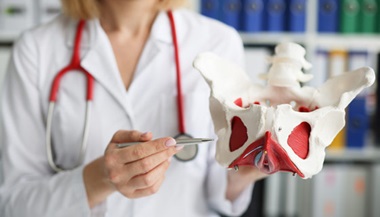Pap Test
What is a Pap test?
For a Pap test, your healthcare provider will collect and examine cells from your cervix. The cervix is the opening to the uterus. He or she will do this test to screen for cervical cancer and other problems.
It’s important to talk with your healthcare provider about when and how often you should have a Pap test. Experts base screening guidelines on your age and risk factors for cervical cancer .
American College of Obstetricians and Gynecologists (ACOG), guidelines include:
-
If you are at least age 21, you should start cervical cancer screening, even if you are not yet sexually active.
-
If you are younger than 30, you can likely be tested for cervical cancer every other year instead of yearly.
-
If you are older than 30 and have had 3 normal Pap tests in a row, you can be tested once every 3 years.
-
If you are at high risk for cervical cancer, you may need more screenings more often the guidelines suggest. Especially if you have a weak immune system or have been treated for abnormal cervical cells in the past.
-
If you are 65 to 70 years old and have had at least 3 normal Pap tests in a row and are not sexually active, and have had no abnormal Pap tests in the past, you may decide with your healthcare provider to stop cervical cancer screening.
-
If you’ve had both your uterus and cervix removed (total hysterectomy), you do not need cervical cancer screening unless you’ve had past surgery for cervical cancer or pre-cancer.
Why might I need a Pap test?
A Pap test, along with a pelvic exam, is an important part of your routine healthcare. It can help find abnormal cells that can lead to cancer. Your healthcare provider can find most cancers of the cervix early if you have regular Pap tests and pelvic exams. Cancer of the cervix is more likely to be successfully treated if it is found early.
The Pap test is useful for finding cancerous cells, and other cervical and vaginal problems such as precancerous cells and inflammation.
Your healthcare provider may use a Pap test to diagnose the following conditions:
-
Inflammation
-
Infection
-
Abnormal cells
-
Precancerous cells
-
Cancer
Your healthcare provider may do a test for the human papilloma virus (HPV) at the same time as a Pap test. Infection with HPV is the most important risk factor for cervical cancer in women over age 30.
Your healthcare provider may have other reasons to recommend a Pap test.
What are the risks for a Pap test?
Tell your healthcare provider if you are allergic to or sensitive to latex.
Tell your healthcare provider if you are pregnant or think you might be.
There may be other risks based on your condition. Be sure to discuss any concerns with your healthcare provider before the procedure.
Certain things may interfere with a Pap test including:
-
Menstruation
-
Use of things, such as vaginal creams, jellies, medicines, or spermicidal foams, for 2 to 3 days before the Pap test, as these substances may alter the pH of the cells or hide abnormal cells
-
Douching for 2 to 3 days before a Pap test as douching can wash away surface cells
-
Sex within 24 hours before the test may cause inflammation of the tissue
-
Infections
-
Certain medicines, such as tetracycline
How do I get ready for a Pap test?
-
Your healthcare provider will explain the procedure and you can ask questions.
-
Tell your healthcare provider if you are sensitive to or are allergic to any medicines, latex, or tape.
-
Generally, you do not need to do anything to prepare for this test.
-
Tell your healthcare provider of all medicines (prescription and over-the-counter) and herbal supplements that you are taking.
-
Tell your healthcare provider when you had your last period, and what type of birth control or hormone therapy, if any, you are using.
-
Tell your healthcare provider if you have a history of bleeding disorders or if you are taking any blood-thinning medicines (anticoagulants), aspirin, or other medicines that affect blood clotting.
-
Tell your healthcare provider if you are pregnant or think you could be.
-
Do not use vaginal medicines, spermicidal foams, creams, or jellies, or douche for 2 to 3 days before the test or for the time set by your health care provider. Avoid sex within 24 hours before the test.
-
You will be asked to empty your bladder before the procedure.
-
Follow any other instructions your provider gives you to get ready.
What happens during a Pap test?
Procedures may vary based on your condition and your healthcare provider's practices.
Generally, a Pap test follows this process:
-
You will be asked to undress from the waist down and put on or cover up with a hospital gown.
-
You will lie on an exam table, with your feet in stirrups.
-
Your healthcare provider will insert an instrument called a speculum into your vagina. This will spread the walls of the vagina apart to show the cervix.
-
Your healthcare provider will use a small brush, swab or spatula to gently remove cells from the cervix and back of the vagina. He or she will place the cells in a vial of liquid or smear the cells on a glass microscope slide.
-
If you need an HPV test, your provider will take a sample of cells for this test as well.
-
If you have symptoms of a vaginal infection, your provider may take a sample of vaginal for testing.
-
Most often, your healthcare provider will do a pelvic exam after the Pap test.
-
Your provider will send the specimen to a lab for further study.
What happens after a Pap test?
You may rest for a few minutes after the procedure before going home. Scraping the cervix may cause a small amount of bleeding. You may want to wear a sanitary pad for any spotting that may occur.
Tell your healthcare provider if you have any of the following:
-
Bleeding
-
Foul-smelling drainage from your vagina
-
Fever or chills
-
Severe abdominal pain
Pap test results usually take a few days. Ask your healthcare provider how you will be hear back about the results.
Your healthcare provider may give you other instructions after the procedure, based on your situation.




.jpg?h=217&iar=0&mh=260&mw=380&w=380&hash=063F5B68869D830339C77D818A678AD5)
